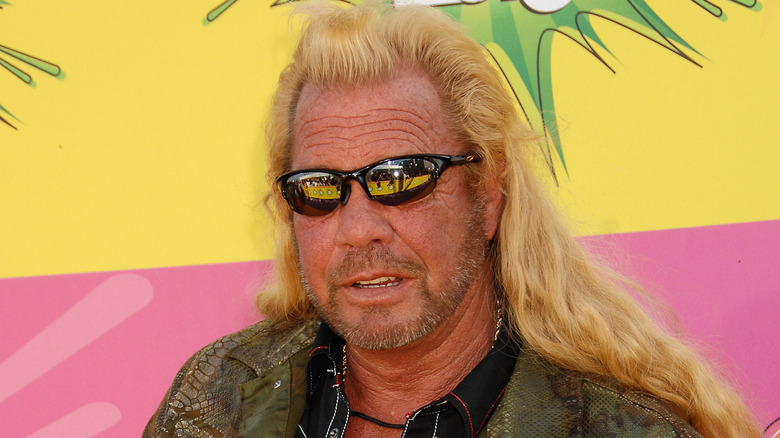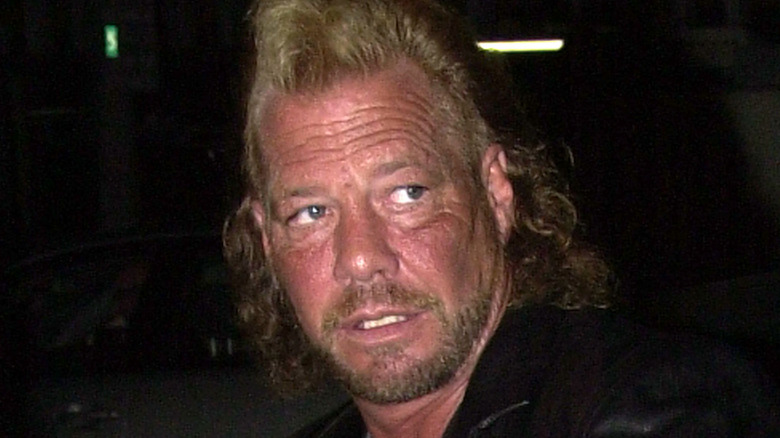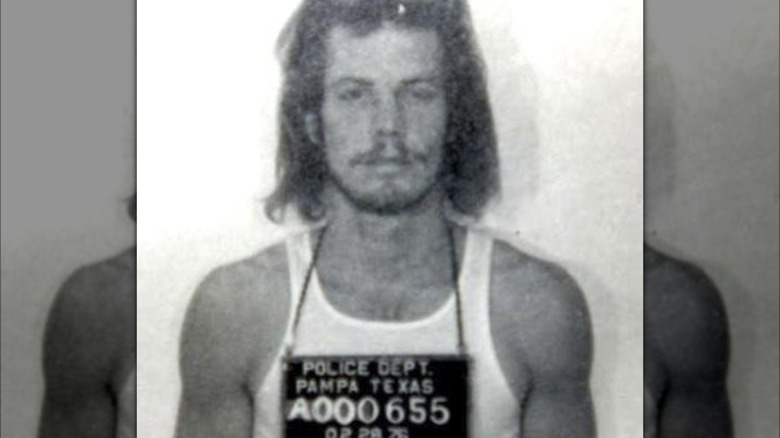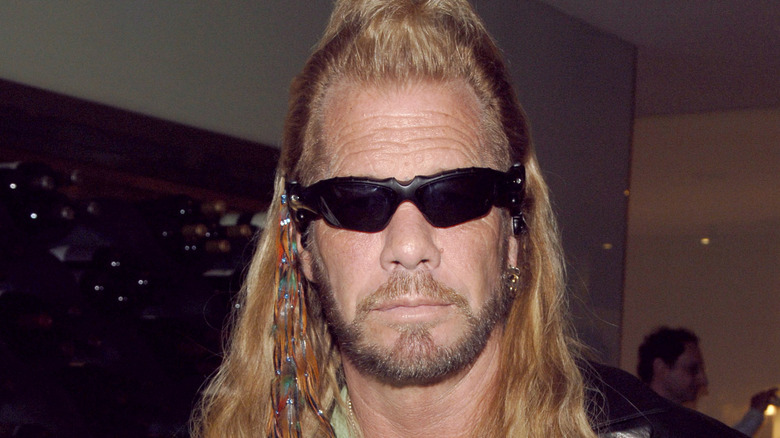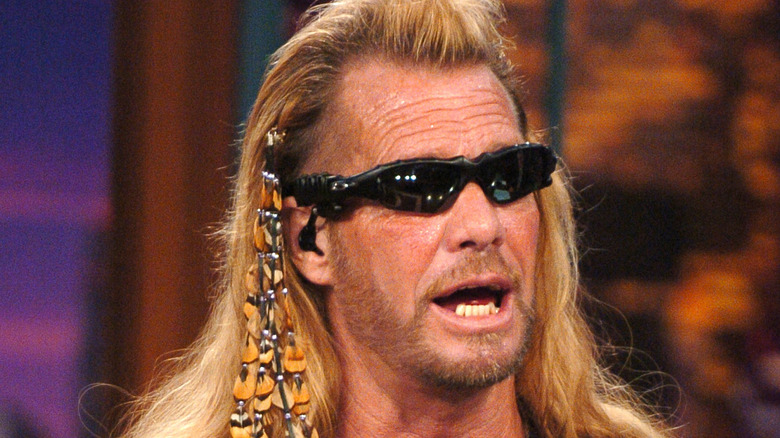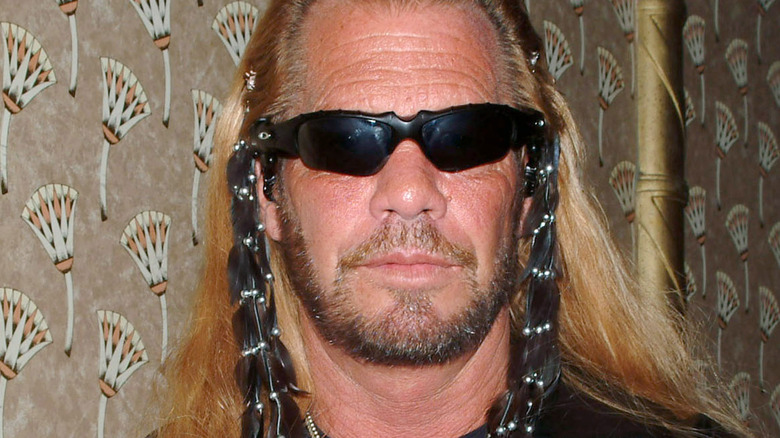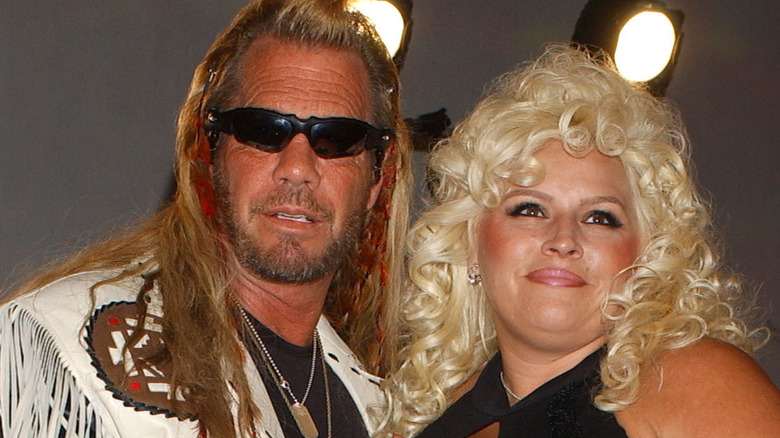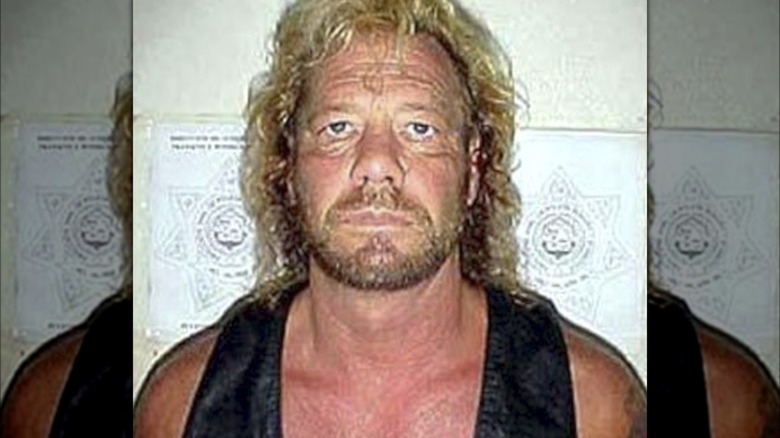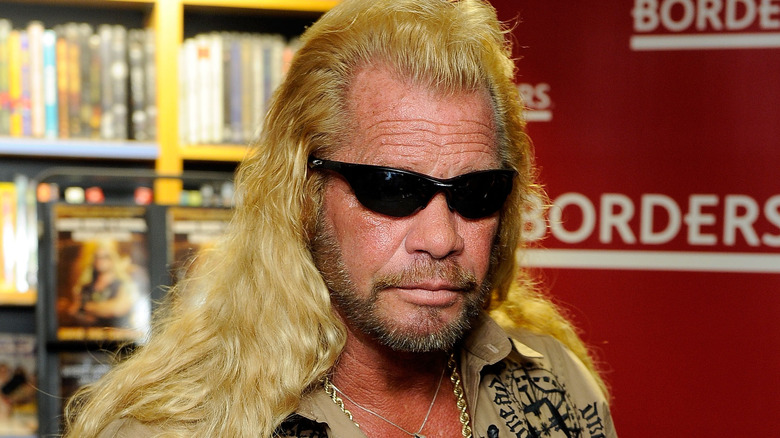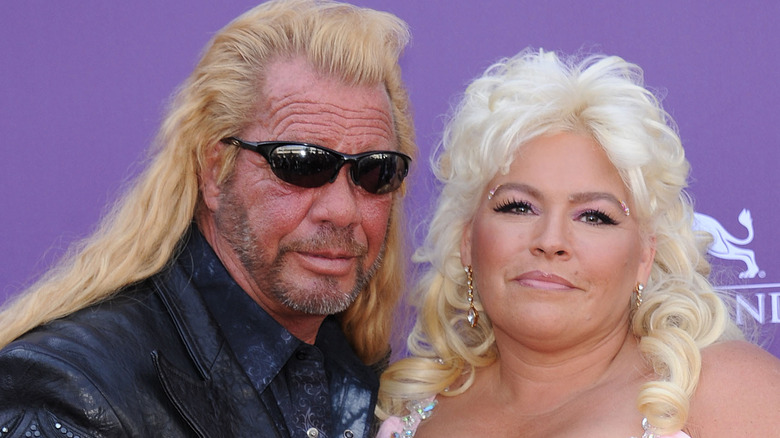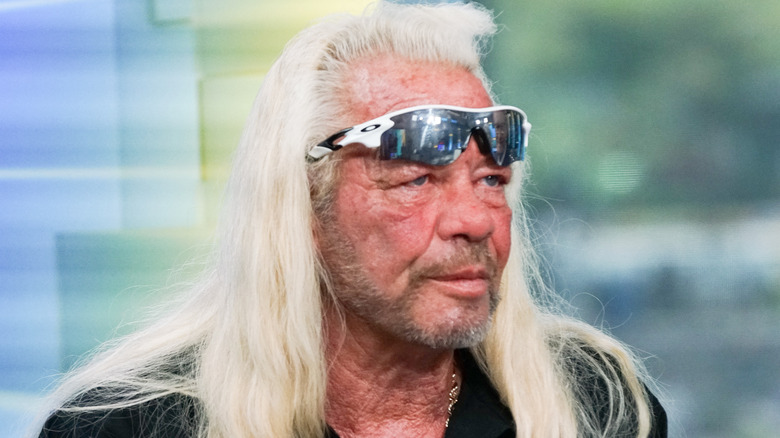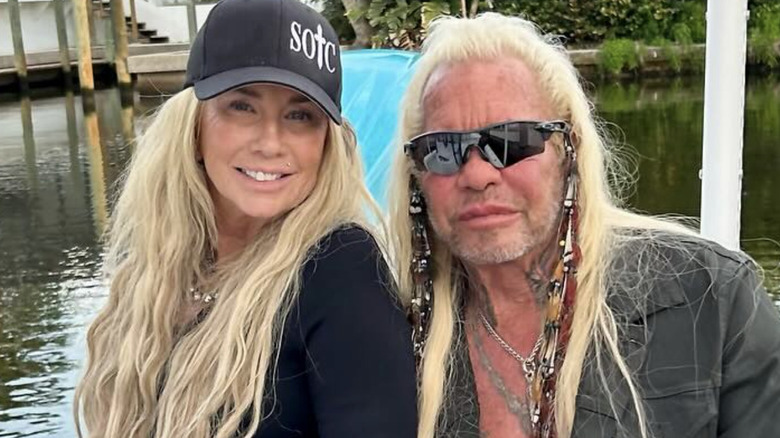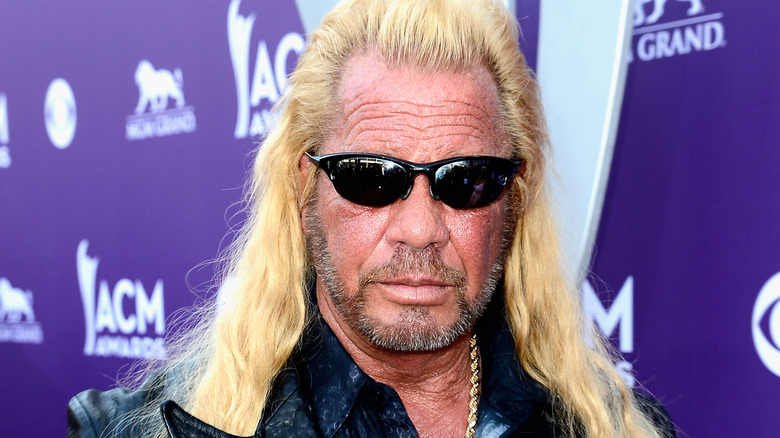The Transformation Of Dog The Bounty Hunter Explained
When "Dog the Bounty Hunter" aired its first episode on A&E in 2003, it heralded the arrival of one of the genre's most indelible personalities. Duane "Dog" Chapman, the most remarkable bounty hunter and bail jumper catcher who ever traversed the dusty back roads and hidden corners of America looking for his fugitives, was unlike anyone else on TV yet seen. He dressed like a futuristic gladiator but also an ancient warrior, and loved to talk tough to criminals almost as much as he liked to wax on lovingly about his wife and hunting partner, Beth.
While he seemed to emerge fully formed to overnight celebrity status, Chapman is a man with a lot of stories and formative moments. A lot happened to make him the person he became. Not always behaving in a polite or savory way, his life has been one full of triumph, loss, and fascinating developments. Here's how Duane Chapman became Dog the Bounty Hunter.
Duane Chapman's emotional childhood
Often discussing his deeply-held religious beliefs on television while tracking down sometimes violent offenders, Chapman was exposed to both phenomena in a big way when he was very young. Raised in Denver in what he characterized as a typical, middle-of-the-road upbringing, Chapman was transfixed with his mother. He believed that she was of Native American descent, and he enjoyed tagging along with her on her summer preaching trips to Sister Jensen's Mission, a primarily Navajo Christian congregation in New Mexico. She'd preach while Chapman helped with the collection plate and hymnals, and it instilled spirituality in the boy. "I wanted to grow up to be just like her," he wrote in "You Can Run But You Can't Hide" (Via CTV News).
Things were far less peaceful with Chapman's father, a physically abusive man he calls Flash. "As a young boy, I never knew that other kids didn't get hit by their dads. I thought it was a rite of passage to have my father knock me around," he wrote. "I can't recall any long stretch of time in my young life when my dad didn't hit me." Flash also used boxing lessons purportedly as a way to make his son more resilient, but Chapman took the sessions as just another form of physical abuse. "I was expected to take it like a man," he recalled.
Duane Chapman was a criminal in his youth
Duane Chapman made a move toward independence at the age of 13 by way of leaving his abusive household, quitting school, and joining a motorcycle gang in Colorado. While running with such a crowd over the next 10 years, Chapman was arrested, charged, and convicted of robbery alone on 18 separate occasions.
His worst offense, and the one that would send him to prison for a long-term sentence, was the result of a drug deal in Texas gone awry. "My brothers — motorcycle gang members — and I pulled up to a house, one of my brothers went in to score some pot," Chapman told "Profiles." A man was shot during the encounter, and after Chapman took him to a hospital, he returned to the original scene of the crime and found that another friend, Jerry Oliver, injured by gunfire, but in seemingly stable condition. After Oliver died in his sleep, Chapman and his fellow gang members were wanted men.
Texas law at the time called for Chapman to be tried for first-degree murder, for which he was convicted and served 18 months in prison. Upon parole, he decided to move on from crime. "I looked in the mirror to shave and heard my dad saying, 'Burn your birth certificate, I wish you were never born,' I said: 'I'm going to change and be the best at whatever I do in the world,'" Chapman told The New York Times.
He fathered a long-lost son
Just before he was imprisoned in the late 1970s on a murder conviction, Duane Chapman dated two women: LaFonda Sue Honeycutt and Debbie White. He'd later marry Honeycutt and they'd have two children together, but after he headed to prison in 1977, he never again saw White; she died by suicide just before his release in 1979.
About 20 years later, Chapman received a call from White's mother. Unbeknownst to him, White had been pregnant by Chapman. She gave birth and placed the baby, a boy, into the foster care system, from which he was later adopted into a permanent home. Chapman tracked down his now adult son, Christopher Michael Hecht, who at the time was in prison after being convicted of committing a hate crime. "After all these years, I finally discovered I have another son, and he's behind bars. It was more than I could bear," Chapman revealed in "You Can Run But You Can't Hide." "I knew what it felt like to be a young man who made foolish choices."
Duane Chapman's first marriage ended in tragedy
Duane Chapman is best known for his steadfast devotion to his late wife, Beth, his costar on "Dog the Bounty Hunter." He'd been married a couple of times before that, during his pre-fame years. His first wedding came in 1972, to La Fonda Sue Honeycutt. The marriage suffered under the weight of Chapman's criminal activity and unfaithfulness, and Honeycutt served her estranged husband with divorce papers while he was incarcerated in Texas. "LaFonda had fallen in love with Jim Darnell, one of my best friends. I was heartbroken," Chapman recalled in "You Can Run, But You Can't Hide."
Unattached and just out of prison in 1979, Chapman attended a motel biker party in Colorado, where he met and became infatuated with Ann Tengell. Following their intimate encounter, Tengell disclosed to the fully adult Chapman that she was 17. Chapman understood what they'd done to be a criminal act, and likely a parole violation that could send him back behind bars. Strictly to ensure that such a thing didn't happen, Chapman proposed marriage. "I married her out of desperation, to keep my freedom," he wrote in his memoir. Nevertheless, that first liaison with Chapman resulted in a pregnancy. The baby, Zebediah, died not long after he was born in 1980, and the marriage was over before long, too.
He worked as a bail bondsman and bounty hunter throughout the 1980s and 1990s
Dog the Bounty Hunter was never the same after prison. Committing himself to a law-abiding lifestyle after he got out in 1979, Duane Chapman, nicknamed Dog by members of his old biker gang, decided to join the other side of the law. He went to work as a bounty hunter, of which he said there were only two other full-time professionals in that field at the time. Chapman became the most high-profile bounty hunter, because he went after FBI-level cases. Working these high-risk, highly paid assignments meant regular check-ins with an agent from the federal law enforcement bureau as well as advanced training. Chapman's FBI contacts eventually set him up tracking down bail skippers out of Colorado. How many fugitives has Dog the Bounty Hunter caught? By the end of the 1980s, more than a thousand, and he did it all with non-fatal weaponry. As a convicted felon, he wasn't legally permitted to own a firearm.
Chapman began to earn accolades from influential figures in the 1990s. Motivational speaker and author Tony Robbins profiled Chapman in his 1991 book "Awaken the Giant Within," which led to celebrity fans like Martin Sheen and Ozzy Osbourne, who had the bounty hunter on his series "The Osbournes." Crime writer Dominick Dunne then asked Chapman to participate in a project documenting the lives of bounty hunters.
When Duane Chapman met Beth Smith
In 1995, Duane Chapman's mother died, and the death seriously upset the bounty hunter. He coped with his grief by spending the next 12 months misusing crack cocaine. After becoming addicted to the drug and considering preemptively removing his children from his care — so that they wouldn't be around while he and his girlfriend abused substances — he placed a phone call to Beth Smith, a woman with whom he'd made a profound connection nine years earlier but had since mostly lost touch. They met on the job — he'd served as her bail bondsman following her arrest for stealing a lemon from a store. He admitted that he'd been misusing crack cocaine, and Smith flew out to see him immediately.
Smith helped Chapman clean up his house and find sobriety, and they began a romantic relationship before they went to work together as bounty hunters. They got married in 2006.
Duane Chapman created an international incident
In a January 2003 trial in Ventura, California, Andrew Luster, an heir to the Max Factor cosmetics fortune, was found guilty on 80 counts, including sexual assault, drugs, and weapons charges. The verdict was delivered in absentia — Luster wasn't there because he'd fled the U.S. during a trial pause after posting the $1 million bail. He'd soon become one of the most famous fugitives Dog the Bounty Hunter has caught. Duane Chapman and his team located and apprehended Luster in Puerto Vallarta, Mexico, in June 2003. Luster was extradited to the U.S. to begin serving a prison sentence of more than 120 years. Chapman went home, too, but he was considered a fugitive from the law in Mexico, where bounty hunting is legally the same thing as kidnapping.
It wasn't until 2006, and after Chapman had starred on "Dog the Bounty Hunter" for a while, that he had to defend his actions in Mexico. He was arrested in Hawaii and charged with illegal detention and conspiracy. Chapman avoided extradition to Mexico, trial, and potential imprisonment when a judge in 2007 dismissed the case after deciding that prosecutors waited too long to start the courtroom portion.
How Duane Chapman became Dog the Bounty Hunter
When Duane "Dog" Chapman went down to Mexico and successfully located and returned convicted criminal Andrew Luster to the United States, he hadn't yet really started his career as a reality TV star. In June 2003, when Chapman made headlines for apprehending Luster — but embroiling himself with Mexican authorities — it was only a few months before the debut of his episode of "Take This Job." The cable TV series profiled individuals with odd and dangerous jobs, and Chapman starred in the episode about bounty hunters, a profession made slightly more high profile with his recent legal issues in Mexico.
Chapman made for such great television that producers of "Take This Job" repurposed unused footage shot for the show into a pilot for a standalone reality TV series. The first of more than 200 episodes of "Dog the Bounty Hunter" aired on A&E in August 2003.
Beth Chapman's death changed everything for Dog the Bounty Hunter
The final season of "Dog the Bounty Hunter," responsible for some of the most disturbing things that happened on reality shows, aired on A&E in 2012, and in 2019, WGN America announced a revival series called "Dog's Most Wanted." Set to focus on the partners-in-everything relationship of married bounty hunter Duane and Beth Chapman, the show instead became partly an emotional and subdued documentary series about a life-ending medical process. Just before filming could start, Beth Chapman was diagnosed with throat cancer, a condition that would turn out to be terminal.
"Beth was adamant, she wanted everything filmed," showrunner Matt Asmus told The New York Times. "Dog's Most Wanted" depicted Chapman undertaking anti-cancer procedures, losing weight and her hair, and a helpless Duane Chapman trying to cope with or understand his wife's condition. In June 2019, after uttering some final loving words to her husband, Beth Chapman fell into a coma, and was then taken off of life support and died. She was 51 years old. "The last few moments she said, 'Come in here right now, in the bathroom.' I went in and she said, 'Look at me.' And I said, 'Yeah, you're freaking beautiful baby,'" he told Entertainment Tonight (via ABC News). "I always saw Beth and she said, 'Please, let me go.'"
His wife's death almost undid Duane Chapman
Following the death of his wife, Beth Chapman, Duane "Dog" Chapman had a medical crisis in September 2019. Hospitalized in Colorado after complaining of chest pains and breathing difficulty, Chapman refused substantial treatment, going so far as to shove "an orderly up against a wall because he wouldn't let me leave," he told The New York Times. Just after the incident, Chapman said his health had improved a little. "It feels much better now. And I'm going through some psychological things right now too, so that doesn't help," Chapman told Colorado's Fox31. "I think, basically, I had a broken heart."
Talk show host and physician Dr. Mehmet Oz convinced Chapman to let him provide a medical assessment. He diagnosed his friend with a pulmonary embolism — a blockage of the arteries that lead to the lungs — that almost cost Dog the Bounty Hunter his life. Chapman thinks it was caused by his overuse of blood-thickening testosterone supplements; he was also diagnosed with gout and had noticed suicidal ideation after his wife died, an ordeal psychologically taxing as well as financial, as years of bills for Beth Chapman's cancer treatments had left Dog financially insolvent. Chapman subsequently promised to seek help for his various medical issues and to lose weight and smoke less.
Duane Chapman found love again
Devastated in a variety of ways after the death of his beloved wife, Beth, Duane Chapman had a health scare that he initially thought was triggered by grief and then found another partner. In 2020, Chapman discussed how the love of Francie Frane, who had similarly dealt with the death of a spouse from cancer, helped him overcome his profound sense of loss. "I scream & Cry Beth where are you why did you leave me then I look up & see you Francie & the pain turns to a smile," Chapman wrote on Instagram in April 2020, a few weeks before the couple announced their engagement.
Chapman and Frane got married in September 2021, without Chapman's daughters Cecily and Bonnie in attendance because they hadn't received invites. Frane told Bonnie Chapman that she wasn't welcome because she'd taken part in Black Lives Matter protests and didn't speak up for her father when he publicly uttered racial slurs. "I can't defend my Dad's racism," she wrote on Facebook.
Dog the Bounty Hunter is still causing controversy
Following an improbable rise from youthful criminal to world's most famous bounty hunter, and both during and after his run of popular cable TV reality shows, Duane "Dog" Chapman has made some hostile, ugly, and ill-advised public statements. In 2007, Chapman's son, Tucker Chapman delivered to the "National Enquirer" a taped phone conversation he'd had with his father regarding a woman he was seeing, and the bounty hunter used a racial epithet in reference to her six times. Duane Chapman admitted to frequently using the N-word in private conversations, but with justification. "I thought I had a pass in the Black tribe to use it, kind of like Eminem," he told Entertainment Tonight. In response, "Dog the Bounty Hunter" network A&E temporarily took the show out of circulation and paused production.
Following the hiring of influencer and transgender activist Dylan Mulvaney as a brand ambassador for Bud Light beer in 2023, Chapman unleashed some violent and hateful rhetoric. "Get that punk down. Rebuke Satan out of him and just give him a couple black eyes," Chapman said in an interview with religious broadcaster Sharell Barrera (via The Advocate), all at once evoking supernatural menace and threatening violence against a person he misgendered. "If I ever see him, I'm dropping him."
If you or anyone you know needs help with addiction issues, may be the victim of child abuse, has experienced a hate crime, or is struggling or in crisis, contact the relevant resources below:
-
The Substance Abuse and Mental Health Services Administration website or contact SAMHSA's National Helpline at 1-800-662-HELP (4357).
-
The Childhelp National Child Abuse Hotline at 1-800-4-A-Child (1-800-422-4453) or contact their live chat services.
-
The VictimConnect Hotline by phone at 1-855-4-VICTIM or by chat for more information or assistance in locating services to help. If you or a loved one are in immediate danger, call 911.
-
Call or text 988 or chat 988lifeline.org
